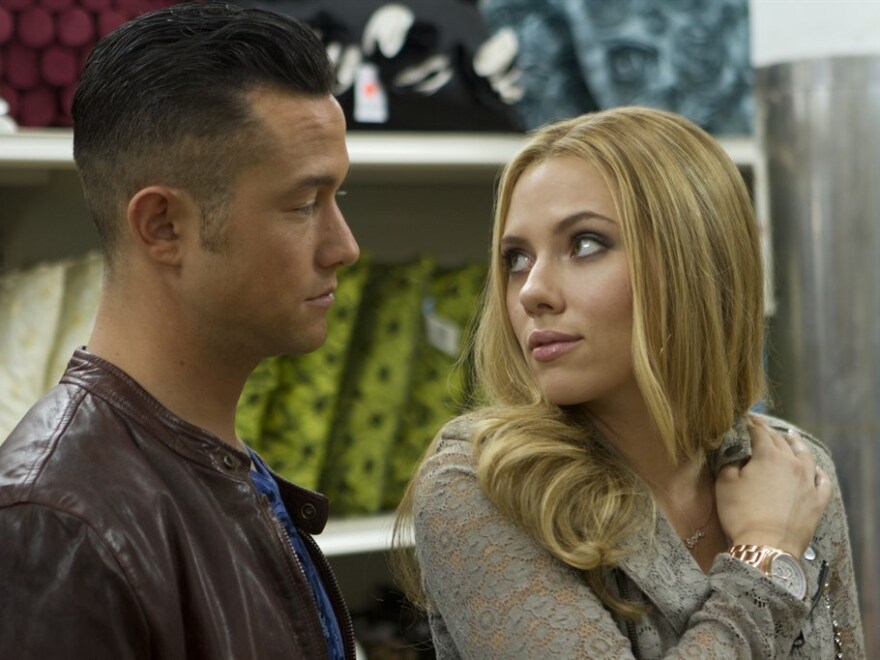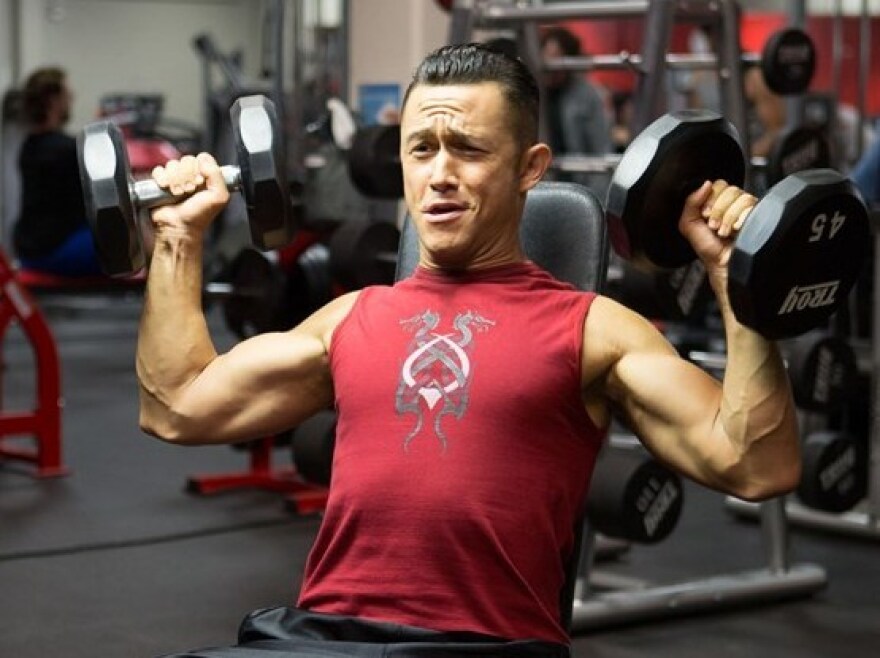Joseph Gordon-Levitt's movie Don Jon is about a young, simple guy with a few basic passions: his body, his pad, his cars, his family, his church, his girls, and his porn.
That's right: Jon is addicted to pornography. You could say he's managing that addiction pretty well — until he becomes taken with Barbara, played by Scarlett Johansson.
Gordon-Levitt makes his writing and directing debut with the film, out in theaters this past Friday. He's been in the entertainment business for a while now --he started young, with a long TV career that included the hit comedy 3rd Rock from the Sun, and his adult work has encompassed everything from the indie (500) Days of Summer to Inception to The Dark Knight Rises — and he tells NPR's Rachel Martin that all along the way, he "paid a lot of attention to the way that media influences how we see the world, and especially when it comes to love and sex and relationships."
"So that's sort of what Don Jon is about," he says. "A boyfriend and a girlfriend; he watches too much pornography, and she watches too many romantic Hollywood movies."
Interview Highlights
On the characters Jon and Barbara
They sort of have these unrealistic expectations for what life can be, based on these two-dimensional images that they've gotten from the different kinds of media that they consume. And I think it leads to some hilarity, and then it also leads to a bit of a coming-of-age story — that the protagonist eventually begins to, sort of, break out of this mold and start actually connecting with people, rather than just comparing them to what he's used to seeing onscreen.
On why he decided to play the lead
I like putting myself in the shoes of somebody who has a different upbringing from me — who has a different perspective from me, who maybe views the world in ways that I would knee-jerk consider wrong — and trying to empathize. You know, my mom and dad brought me up to question dominant cultural gender roles. The character Jon is the opposite of that.
On Esther, the character played by Julianne Moore
Well if Jon and Barbara are sort of all about the front that they put up and all about trying to fit into a mold, Esther is a character who's present and honest to a fault. She can't step out of her present, because she's going through some stuff that makes it too painful for her. So she's just present; she's just honest, she's just on the surface. And when you put a character like that next to a character like Jon, first of all it's going to be funny. And second of all, you know, they both provide something to the other that they both need.
Yeah, it's unexpected, but I find that in my life anyway, that's oftentimes the people I connect with in the most — when I'm honest, the most profound ways — is people I wouldn't necessarily expect to. If you forget the accoutrements, all the labels, all the like, "Well they have this job, they come from this place, they went to this school, they blah-blah-blah-blah-blah ..." If you forget all of that and you're just paying attention to who's standing right in front of you and what they're saying and doing right now, I find oftentimes the people I connect with most are not the people I would expect to.
On the availability of pornography in our culture
Honestly I wouldn't limit it to pornography. I pay a lot of attention to media in general. And I think I wanted to make pornography sort of central in the movie to compare the rest of our media to it. I think that there's not a substantial difference between a lot of main-stream culture and pornography. They're equally simplistic, reductionist.

There's a [sexually explicit] Carl's Jr. commercial that's featured in Don Jon, and we play it pretty much in its entirety. ... That's a real commercial. We didn't change it at all! I think it played on the Super Bowl, if I'm not mistaken.
So that's what I'm saying. ... Whether it's rated X or "approved by the FCC for general viewing audiences," the message is the same. We have a tendency in our culture to take people and treat them like things.
I think, though, that everybody experiences this sometimes. I'm sure you've experienced it, where you're, you know, talking to someone but you can kind of tell that they've already decided what you are, they've put you in a box with a label on it. ... And that's, I guess, what I wanted to bring up and talk about in the movie. And I find that the best way to talk about substantial subject matters, oftentimes, is with humor.
On how the film has affected the way he consumes media
I try to be proactive. I mean, which isn't to say that I don't consume media that in certain ways might be unhealthy, or whatever. It's not like I'm only consuming, you know — I'm not just reading Foucault all day long.
But I think that it's worth recognizing that the media that we all choose to consume, that actually does make a difference. That is us participating in a larger cultural conversation. You know, I think we all sometimes like to think of whatever we watch as, "Ah, it doesn't matter what I watch, it's all just harmless entertainment." And it's not entirely true. Especially if you watch it repeatedly. I think that the stuff we watch does matter and it does work its way into the way that we see the world.
Copyright 2021 NPR. To see more, visit https://www.npr.org.


